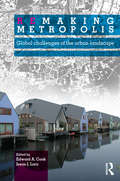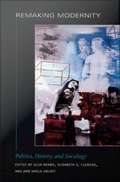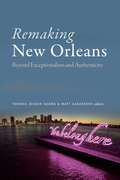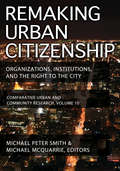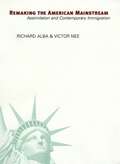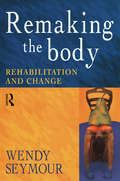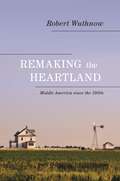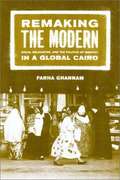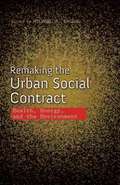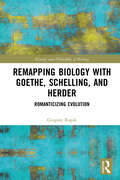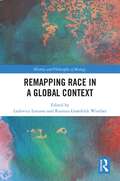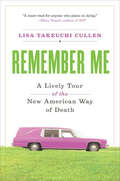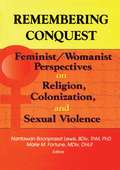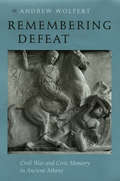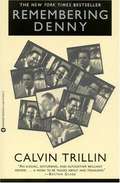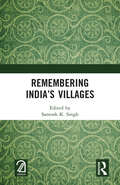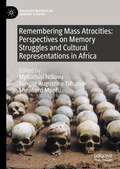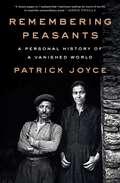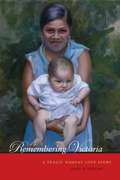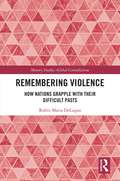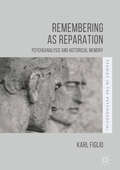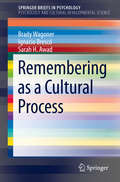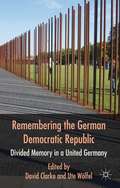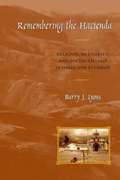- Table View
- List View
Remaking Metropolis: Global Challenges of the Urban Landscape
by Edward A. Cook Jesus J. LaraRemaking Metropolis examines examples of both urban decay and destruction as well as urban rebirth. It shows why particular approaches were successful, or did not achieve their objectives. By bringing together innovative approaches to urban living from across the world, and by demonstrating how local initiatives can contribute to global solutions, the book establishes a framework in which to evaluate current and future developments for urban change, and to stimulate a reassessment of urban redevelopment and policies. "Think Globally, Act Locally" is an oft used phrase to encourage citizens to take steps close to home as part of addressing overarching environmental issues. Critics of this view point to the potential for parochial or even myopic approaches, while supporters argue that it creates both a more sustainable and a more culturally grounded environment. Remaking Metropolis brings together real world experiences that combine local action with a global world view, to demonstrate the continuum between the local and the remote. At the same time the compartmentalization of contemporary perspectives towards human life in the fields of science, design, ecology, medicine, and politics is leading to increased fragmentation of the mind, body, city, and globe. By bridging these artificial divides between disciplines, this collection of individual case studies demonstrates the holistic approach necessary for a genuinely sustainable urban condition.
Remaking Modernity: Politics, History, and Sociology
by Julia Adams Elisabeth S. Clemens Ann Shola OrloffA state-of-the-field survey of historical sociology, Remaking Modernity assesses the field's past accomplishments and peers into the future, envisioning changes to come. The seventeen essays in this collection reveal the potential of historical sociology to transform understandings of social and cultural change. The volume captures an exciting new conversation among historical sociologists that brings a wider interdisciplinary project to bear on the problems and prospects of modernity. The contributors represent a wide variety of theoretical orientations and a broad spectrum of understandings of what constitutes historical sociology. They address such topics as religion, war, citizenship, markets, professions, gender and welfare, colonialism, ethnicity, bureaucracy, revolutions, collective action, and the modernist social sciences themselves. Remaking Modernity includes a significant introduction in which the editors consider prior orientations in historical sociology in order to analyze the field's resurgence. They show how current research is building on and challenging previous work through attention to institutionalism, rational choice, the cultural turn, feminist theories and approaches, and colonialism and the racial formations of empire. Contributors Julia Adams Justin Baer Richard Biernacki Bruce Carruthers Elisabeth Clemens Rebecca Jean Emigh Russell Faeges Philip Gorski Roger Gould Meyer Kestnbaum Edgar Kiser Ming-Cheng Lo Zine Magubane Ann Shola Orloff Nader Sohrabi Margaret Somers Lyn Spillman George Steinmetz
Remaking New Orleans: Beyond Exceptionalism and Authenticity
by Matt Sakakeeny Thomas Jessen AdamsApproached as a wellspring of cultural authenticity and historical exceptionality, New Orleans appears in opposition to a nation perpetually driven by progress. Remaking New Orleans shows how this narrative is rooted in a romantic cultural tradition, continuously repackaged through the twin engines of tourism and economic development, and supported by research that has isolated the city from comparison and left unquestioned its entrenched inequality. Working against this feedback loop, the contributors place New Orleans at the forefront of national patterns of urban planning, place-branding, structural inequality, and racialization. Nontraditional sites like professional wrestling matches, middle-class black suburbs, and Vietnamese gardens take precedence over clichéd renderings of Creole cuisine, voodoo queens, and hot jazz. Covering the city's founding through its present and highlighting changing political and social formations, this volume remakes New Orleans as a rich site for understanding the quintessential concerns of American cities. Contributors. Thomas Jessen Adams, Vincanne Adams, Vern Baxter, Maria Celeste Casati Allegretti, Shannon Lee Dawdy, Rien Fertel, Megan French-Marcelin, Cedric G. Johnson, Alecia P. Long, Vicki Mayer, Toby Miller, Sue Mobley, Marguerite Nguyen, Aaron Nyerges, Adolph Reed Jr., Helen A. Regis, Matt Sakakeeny, Heidi Schmalbach, Felipe Smith, Bryan Wagner
Remaking Urban Citizenship: Organizations, Institutions, and the Right to the City (Comparative Urban And Community Research Ser.)
by Andrew M. GreeleyDue to heightened global migration and transnational mobility, many residents of the world's cities lack national citizenship in the places to which they have moved for work, refuge, or retirement. The disjuncture between citizenship and daily life has led to devolution of claims from national to urban space. Within nation-states characterized by structured inequalities, citizens have not reduced their social differences. This leads increasingly to calls for greater direct involvement of marginalized classes in reshaping the institutions and spaces directly affecting their lives.These concerns—cities without citizenship and people without political power—inform the agendas of organizations that seek to restructure urban citizenship in more democratic directions. Remaking Urban Citizenship focuses on the uses and limits of such political organizations and coalitions, shows the various ways they pursue expanded rights within the city, and describes the institutional changes necessary to empower global migrants and popular classes as urban citizens.Offering individual or comparative case studies of cities in the United States, Europe, and China, contributions to this volume describe the development of actual practices of organizations working to reinvigorate citizenship at the urban scale. Collectively, they locate institutional forms that help migrants lay claim to their cities, show how migrants can become politically empowered, and identify how they can expand their rights or find other ways to belong.
Remaking the American Dream: The Informal and Formal Transformation of Single-Family Housing Cities (Urban and Industrial Environments)
by Vinit MukhijaThe redefinition of the single-family house, the urban landscape, and the American Dream.Sitting squarely at the center of the American Dream, the detached single-family home has long been the basic building block of most US cities. In Remaking the American Dream, Vinit Mukhija considers how this is changing, in both the American psyche and the urban landscape.In defiance of long-held norms and standards, single-family housing is slowly but significantly transforming through incremental additions of second and third units. Drawing on empirical evidence of informal and formal changes, Remaking the American Dream documents homeowners&’ quiet unpermitted modifications, conversions, and workarounds, as well as gradual institutional alterations to once-rigid local land-use regulations. Mukhija&’s primary case study is Los Angeles and the role played by the State of California—findings he contrasts with the experience of other cities including Santa Cruz, Seattle, Portland, Minneapolis, and Vancouver. In each instance, he shows how, and asks why, homeowners are adapting their homes and governments are changing the rules that regulate single-family housing to allow for accessory dwelling units (ADUs) or second units.Key to Mukhija&’s research is the question of why the idea of single-family living is changing and what this means for the future of US cities. The answer, this book suggests, heralds nothing less than a redefinition of American urbanism—and the American Dream.
Remaking the American Mainstream: Assimilation And Contemporary Immigration
by Victor Nee Richard D. ALBAIn this age of multicultural democracy, the idea of assimilation--that the social distance separating immigrants and their children from the mainstream of American society closes over time--seems outdated and, in some forms, even offensive. But as Richard Alba and Victor Nee show in the first systematic treatment of assimilation since the mid-1960s, it continues to shape the immigrant experience, even though the geography of immigration has shifted from Europe to Asia, Africa, and Latin America. Institutional changes, from civil rights legislation to immigration law, have provided a more favorable environment for nonwhite immigrants and their children than in the past. Assimilation is still driven, in claim, by the decisions of immigrants and the second generation to improve their social and material circumstances in America. But they also show that immigrants, historically and today, have profoundly changed our mainstream society and culture in the process of becoming Americans. Surveying a variety of domains--language, socioeconomic attachments, residential patterns, and intermarriage--they demonstrate the continuing importance of assimilation in American life. And they predict that it will blur the boundaries among the major, racially defined populations, as nonwhites and Hispanics are increasingly incorporated into the mainstream. Table of Contents: Preface 1. Rethinking Assimilation 2. Assimilation Theory, New and Old 3. Assimilation in Practice: The Europeans and East Asians 4. Was Assimilation Contingent on Specific Historical Conditions? 5. The Background to Contemporary Immigration 6. Evidence of Contemporary Assimilation 7. Conclusion: Remaking the Mainstream Notes Index Reviews of this book: Sociologists Alba and Nee provide a superb, comprehensive analysis of theory, data, and history to revise past and contemporary understandings of immigration and assimilation in the U.S. Their goal is to respond to skeptics' pessimism about new immigrants' assimilability, question misconception about the assimilation experiences of previous and current immigrant groups, reject normative baggage attached to notions of assimilation, and answer the question, 'What can assimilation look like in such a diverse and ethnically dynamic society?'--S. M. Green, ChoiceAlba and Nee have written a carefully theorized, thoughtfully argued, and empirically well-grounded book. They demonstrate persuasively that the so-called "new" immigration is not terribly different from previous ones, and that most of the descendants of today's Hispanic, Asian, and other newcomers are assimilating in much the same way as the children and grandchildren of the European immigration. Their contribution to our understanding of immigration, ethnicity and race should be read far beyond the worlds of social science scholarship.--Herbert J. Gans, Author of Democracy and the NewsAssimilation is dead, long live assimilation! Alba and Nee are fully aware of the flaws and biases in the old model of the "melting pot," but they rehabilitate it with elegant theory, persuasive facts, and careful attention to its continued racial and class-based failings. The idea of assimilation may be unfashionable, but it has the singular virtue of fitting the case--for many Americans, at any rate--more than other trendier theories do. Remaking the American Mainstream shows us how, why, and to what end.--Jennifer L. Hochschild, co-Author, The American Dream and the Public SchoolsAlba and Nee have accomplished a tour de force. They have an important story to tell and they've told it with great verve and skill, using prose that will allow this book to be widely read. Remaking the American Mainstream is an outstanding work that is truly worthy of the important topic it addresses.--Roger Waldinger, author of Still the Promised City?: African-Americans and New Immigrants in Postindustrial New York<b
Remaking the Body: Rehabilitation and Change
by Wendy SeymourIn Remaking the Body, Wendy Seymour interviews men and women who have suffered profound bodily paralysis, and explores how they deal with their appearance, relationships, sexuality, incontinence and sport. She finds that even major impairment hasn't annihilated these people's experience of an embodied self. She shows that the process of self-reconstruction is interwoven with social expectations and argues that the experience of disability highlights the continuous work involved in embodiment for everyone. Remaking the Body is a major contribution to the field of the sociology of the body and essential reading for rehabilitation professionals and students.
Remaking the Heartland: Middle America since the 1950s
by Robert WuthnowThe social transformation of the American Midwest in the postwar eraFor many Americans, the Midwest is a vast unknown. In Remaking the Heartland, Robert Wuthnow sets out to rectify this. He shows how the region has undergone extraordinary social transformations over the past half-century and proven itself surprisingly resilient in the face of such hardships as the Great Depression and the movement of residents to other parts of the country. He examines the heartland's reinvention throughout the decades and traces the social and economic factors that have helped it to survive and prosper.Wuthnow points to the critical strength of the region's social institutions established between 1870 and 1950--the market towns, farmsteads, one-room schoolhouses, townships, rural cooperatives, and manufacturing centers that have adapted with the changing times. He focuses on farmers' struggles to recover from the Great Depression well into the 1950s, the cultural redefinition and modernization of the region's image that occurred during the 1950s and 1960s, the growth of secondary and higher education, the decline of small towns, the redeployment of agribusiness, and the rapid expansion of edge cities. Drawing his arguments from extensive interviews and evidence from the towns and counties of the Midwest, Wuthnow provides a unique perspective as both an objective observer and someone who grew up there.Remaking the Heartland offers an accessible look at the humble yet strong foundations that have allowed the region to endure undiminished.
Remaking the Modern: Space, Relocation, and the Politics of Identity in a Global Cairo
by Farha GhannamAn ethnography of a housing project in Cairo, which demonstrates how the modernizing efforts of the Egyptian government runs headlong into the traditional customs of the area's low-income residents. Brings new meaning to the phrase "global and local."
Remaking the Urban Social Contract: Health, Energy, and the Environment
by Michael A. PaganoThis new volume draws from provocative discussions on the urban social contract among policy makers, researchers, public intellectuals, and citizens at the 2015 UIC Urban Forum. Michael A. Pagano presents papers that emphasize political agreements, disagreements, challenges, and controversies on health, energy, and environmental policies. Authors explore the substantive and philosophical changes in the urban social contract and offer proposals for remaking it in the new century. Topics range from big-picture analyses to specifics covering areas like public services, the smart cities movement, and greening strategies. Contributors: Alba Alexander, Megan Houston, Dennis R. Judd, Cynthia Klein-Banai, William C. Kling, Howard A. Learner, David A. McDonald, David C. Perry, Emily Stiehl, Anthony Townsend, Natalia Villamizar-Duarte, and Moira Zellner.
Remapping Biology with Goethe, Schelling, and Herder: Romanticizing Evolution (History and Philosophy of Biology)
by Gregory RupikRemapping Biology with Goethe, Schelling, and Herder recruits a Romantic philosophy of biology into contemporary debates to both integrate the theoretical implications of ecology, evolution, and development, and to contextualize the successes of the Modern Evolutionary Synthesis’s gene’s-eye-view of biology.The dominant philosophy of biology in the twentieth century was one developed within and for the Modern Evolutionary Synthesis. As biologists like those developing an Extended Evolutionary Synthesis have pushed the limits of this paradigm, fresh philosophical approaches have become necessary. This book makes the case that an organicism developed by the 19th century figures Goethe, Schelling, and Herder offers surprising resources to navigate the contemporary biological and evolutionary terrain. This “metamorphic organicism” resonates with present trends in biological theory that emphasize process, organismal dynamics, ecology, and agency. It also proposes strategies for reintegrating reductive and mechanistic maps of biology, like those of the Modern Evolutionary Synthesis, into richer theoretical representations of life.Drawing from cutting-edge biology, Romantic history, and perspectival pluralist literatures, this integrated history-and-philosophy-of-biology will be of interest to students and scholars interested in the genesis of current theoretical tensions in evolutionary biology, and to those seeking constructive ways to resolve those tensions, including practicing biologists and educators.
Remapping Race in a Global Context (History and Philosophy of Biology)
by Ludovica LorussoInvestigating the reality and significance of racial categories, Remapping Race in a Global Context examines the role of race in human genomics, biomedicine, and struggles for social justice around the world. In this book, biologists, anthropologists, historians, and philosophers inspect critical questions around the biological reality of race and how it has been understood in different national and regional contexts. The essays also examine debates on the usefulness of race in medical and epidemiological studies. With a focus on the fields of human genomics and biomedicine, this book presents critical findings on whether and how race might be ethically and epistemologically justified in our age of personalized medicine, mass surveillance, and biased algorithms. The book will be of interest to researchers and advanced students in a broad range of scientific and humanistic disciplines, including biology, anthropology, geography, philosophy, cultural or community studies, critical race theory, and any field concerned with the deep racial dividing lines running across societies globally.
Remember Me: A Lively Tour of the American Way of Dea
by Lisa Takeuchi CullenIn Remember Me, Time writer Lisa Takeuchi Cullen has created a humorous and poignant chronicle of her travels around the country to discover how Americans are reinventing the rites of dying. What she learned is that people no longer want to take death lying down; instead, they're taking their demise into their own hands and planning the afterparty. Cullen hears stories of modern-day funerals: lobster-shaped caskets and other unconventional containers for corpses; cremated remains turned into diamonds; and even mishaps like dove releases gone horribly wrong. Eye-opening, funny, and unforgettable, Remember Me gives an account of the ways in which Americans are designing new occasions to mark death—by celebrating life.
Remembering Conquest: Feminist/Womanist Perspectives on Religion, Colonization, and Sexual Violence
by Nantawan B LewisRemembering Conquest: Feminist/Womanist Perspectives on Religion, Colonization, and Sexual Violence addresses the issue of sexual violence against women from feminist and womanist theological perspectives. Taken from proceedings of a panel discussion at the 1998 annual meeting of the American Academy of Religion, this informative book offers sociologists, clergy, and women an examination of how negative stereotypes in society are derived from Christian perspectives and other religions. Exploring abuse against Native American, African- American, Filipino, and Thai women, Remembering Conquest will help you recognize the combination of issues that lead to violence against women. Thorough and compelling, this valuable book will urge you to advocate for change in how religious groups interpret women so that religion can provide a moral and ethical source of equality for women instead of a social barrier.This intelligent book will help you understand the changes that need to be made as you read about numerous atrocities, including: the history of violence experienced by American Indian women during colonization and realizing that prior to this time, sexual violence did not exist in American Indian societies how the United States’colonization of Thailand is directly related to sexual violence today against women, which is expressed in the form of the booming sex industry as well as the AIDS epidemic how poverty in the Philippines has made women and children second-class citizens who must make the ultimate sacrifice and sell their bodies and their souls to surviveRemembering Conquest provides you with a unique religious perspective on the subject of violence against women to enlighten you as to how religion can unknowingly help or hinder a woman’s healing. You will discover how to assist religious communities in rediscovering new interpretations of their faith traditions and become a moral and ethical source of liberation for women, such as holding perpetrators of abuse responsible for their actions and not insinuating that the abuse victim needs to be “helped” by religion in some way. Compelling and informative, Remembering Conquest provides you with ideas to help bring healing and power to women who are suffering injustices by reinterpreting faith traditions.
Remembering Defeat: Civil War and Civic Memory in Ancient Athens
by Andrew WolpertIn 404 b.c. the Peloponnesian War finally came to an end, when the Athenians, starved into submission, were forced to accept Sparta's terms of surrender. Shortly afterwards a group of thirty conspirators, with Spartan backing ("the Thirty"), overthrew the democracy and established a narrow oligarchy. Although the oligarchs were in power for only thirteen months, they killed more than 5 percent of the citizenry and terrorized the rest by confiscating the property of some and banishing many others. Despite this brutality, members of the democratic resistance movement that regained control of Athens came to terms with the oligarchs and agreed to an amnesty that protected collaborators from prosecution for all but the most severe crimes. The war and subsequent reconciliation of Athenian society has been a rich field for historians of ancient Greece. From a rhetorical and ideological standpoint, this period is unique because of the extraordinary lengths to which the Athenians went to maintain peace. In Remembering Defeat, Andrew Wolpert claims that the peace was "negotiated and constructed in civic discourse" and not imposed upon the populace. Rather than explaining why the reconciliation was successful, as a way of shedding light on changes in Athenian ideology Wolpert uses public speeches of the early fourth century to consider how the Athenians confronted the troubling memories of defeat and civil war, and how they explained to themselves an agreement that allowed the conspirators and their collaborators to go unpunished. Encompassing rhetorical analysis, trauma studies, and recent scholarship on identity, memory, and law, Wolpert's study sheds new light on a pivotal period in Athens' history.
Remembering Denny
by Calvin TrillinAuthor examines the life of Denny, the emblematic college hero of 1957 America. From Denny's Yale graduation and turn as a Rhodes Scholar to his eventual suicide as a middle-aged, mid-level academic, author charts the mysterious course of a life.
Remembering India’s Villages
by Santosh K. SinghIn the time of agrarian crisis and movement, Remembering India’s Villages centralises the rural India—examining its stubborn past and dynamic present. Departing from the myth of little republics, it sees villages in cinema, development discourses, and debates among the founders of modern India like Gandhi, Nehru, Tagore and Ambedkar. Empirical research, multidisciplinary perspective, and cross-cultural insights are useful aids in this book toward understanding the reality of the rural that comprises structural anomalies and social possibilities. The book remembers India’s villages under the trope of reconstitution rather than disappearance. The book adds to the renewed interest in village studies, rural sociology, development studies, and intellectual history. This book is co-published with Aakar Books. Print edition not for sale in South Asia (India, Sri Lanka, Nepal, Bangladesh, Pakistan and Bhutan)
Remembering Mass Atrocities: Perspectives on Memory Struggles and Cultural Representations in Africa (Palgrave Macmillan Memory Studies)
by Shepherd Mpofu Mphathisi Ndlovu Lungile Augustine TshumaThis book explores how popular cultural artifacts, literary texts, commemorative practices and other forms of remembrances are used to convey, transmit and contest memories of mass atrocities in the Global South. Some of these historical atrocities took place during the Cold war. As such, this book unpacks the influence or role of the global powers in conflict in the Global South. Contributors are grappling with a number of issues such as the politics of memorialization, memory conflicts, exhumations, reburials, historical dialogue, peacebuilding and social healing, memory activism, visual representation, transgenerational transmission of memories, and identity politics.
Remembering Peasants: A Personal History of a Vanished World
by Patrick Joyce&“I had been waiting for much of my life to read this extraordinary book…there are clues and messages for every fortunate reader who picks it up.&” —Annie Proulx *A New York Times Book Review Editors&’ Choice* A landmark history of the peasant experience, exploring a now neglected way of life that once encompassed most of humanity, but is rapidly vanishing in our time.&“What the skeleton is to anatomy, the peasant is to history, its essential hidden support.&” For over the past century and a half, and most notably over the last seventy years, the world has become increasingly urban, and the peasant way of life—the dominant way of life for humanity since agriculture began well over 6,000 years ago—is disappearing. In this vital history of peasantry, social historian Patrick Joyce aims to tell the story of this lost world and its people, and how we can commemorate their way of life. In one sense, this is a global history, ambitious in scope, taking us from the urbanization of the early 19th century to the present day. But more specifically, Joyce&’s focus is the demise of the European peasantry and of their rites, traditions, and beliefs. Alongside this he brings in stories of individuals as well as places, including his own family, and looks at how peasants and their ways of life have been memorialized in photographs, literature, and in museums. Joyce explores a people whose voice is vastly underrepresented, and is usually mediated through others, in human history—and now peasants are vanishing in one of the greatest historical transformations of our time. Written with the skill and authority of a great historian, Remembering Peasants is a &“first-class work&” (Kirkus Reviews), a richly complex and passionate history written with exquisite care. It is also deeply resonant, as Joyce shines a light on people whose knowledge of the land is being irretrievably lost during our critical time of climate crisis and the rise of industrial agriculture. Enlightening, timely, and vitally important, this book commemorates an extraordinary culture whose impact on history—and the future—remains profoundly relevant.
Remembering Victoria: A Tragic Nahuat Love Story
by James M. TaggartOn October 15, 1983, a young mother of six was murdered while walking across her village of Huitzilan de Serdán, Mexico, with her infant son and one of her daughters. This woman, Victoria Bonilla, was among more than one hundred villagers who perished in violence that broke out soon after the Mexican army chopped down a cornfield that had been planted on an unused cattle pasture by forty Nahuat villagers.<P><P>In this anthropological account, based on years of fieldwork in Huitzilan, James M. Taggart turns to Victoria's husband, Nacho Angel Hernández, to try to understand how a community based on respect and cooperation descended into horrific violence and fratricide. When the army chopped down the cornfield at Talcuaco, the war that broke out resulted in the complete breakdown of the social and moral order of the community.
Remembering Violence: How Nations Grapple with their Difficult Pasts (Memory Studies: Global Constellations)
by Robin Maria DeLuganThis volume examines the ways in which the violent legacies of the twentieth century continue to affect the concept of the nation. Through a study of three societies’ commemoration of notorious episodes of 1930s state violence, the author considers the manner in which attention to the state violence authoritarianism, and exclusions of the last century have resulted in challenges to dominant conceptions of the nation. Based on extensive ethnographic research in El Salvador, Spain, and the Dominican Republic, Remembering Violence focuses on new public sites of memory, such as museum exhibitions, monuments, and commemorations – powerful loci for representing ideas about the nation – and explores the responses of various actors – civil society, government, and diasporic citizens – as well as those of UN and other international agencies invested in new nation-building goals. With attention to the ways in which memory practices explain ongoing national exclusions and contemporary efforts to contest them, this book will appeal to scholars across the social sciences and humanities with interests in public memory and commemoration.
Remembering as Reparation
by Karl FiglioBelow we have provided very simple written essay and speech on the Mahatma Gandhi, a person who would always live in the heart of everyone. Every kid and children of the India know him by the name of Bapu or Father of the Nation. Using this you can help your kids and school going children to write essay or recite speech on the Mahatma Gandhi in their school
Remembering as a Cultural Process (SpringerBriefs in Psychology)
by Brady Wagoner Sarah H. Awad Ignacio BrescóThis brief charts out principles for a cultural psychology of remembering. The idea at its core is a conceptualization of remembering as a constructive process--something that occurs at the intersection of a person and their social-cultural world. To do this, it moves away from the traditional metaphor of memory as storage and develops the alternative metaphor of construction as part of wider social and cultural developments in society. This new approach is developed from key ideas of Lev Vygotsky and Frederic Bartlett, in particular their concepts of mediation and reconstructive remembering. From this foundation, the authors demonstrate how remembering is conflictual, evolving, and transformative at both the individual and collective level. This approach is illustrated with concrete case studies, which highlight key theoretical concepts moving from micro-level processes to macro-level social phenomena. Among the topics covered are:The microgenesis of memories in conversationThe role of narrative mediation in the recall of historyRemembering through social positions in conflictsUrban memory during revolutionsHow memorials are used to channel grief and collective memoryRemembering as a Cultural Process traces our ongoing journey to answer the question of the different ways in which culture participates in and is constitutive of what it means for humans to remember. It will be of interest to undergraduate and graduate students as well as researchers in the fields of memory studies or cultural psychology.
Remembering the German Democratic Republic
by David Clarke Ute WölfelMemories of and attitudes to the German Democratic Republic (GDR), or East Germany, within contemporary Germany are characterized by their variety and complexity, whilst the debate over how to remember the GDR tells us a lot about how Germans see themselves and their future. This volume provides a range of international perspectives.
Remembering the Hacienda: Religion, Authority, and Social Change in Highland Ecuador
by Barry J. LyonsFrom the colonial period through the mid-twentieth century, haciendas dominated the Latin American countryside. In the Ecuadorian Andes, Runa--Quichua-speaking indigenous people--worked on these large agrarian estates as virtual serfs. In Remembering the Hacienda: Religion, Authority, and Social Change in Highland Ecuador, Barry Lyons probes the workings of power on haciendas and explores the hacienda's contemporary legacy.<P><P>Lyons lived for three years in a Runa village and conducted in-depth interviews with elderly former hacienda laborers. He combines their wrenching accounts with archival evidence to paint an astonishing portrait of daily life on haciendas. Lyons also develops an innovative analysis of hacienda discipline and authority relations. Remembering the Hacienda explains the role of religion as well as the reshaping of Runa culture and identity under the impact of land reform and liberation theology. <P> This beautifully written book is a major contribution to the understanding of social control and domination. It will be valuable reading for a broad audience in anthropology, history, Latin American studies, and religious studies.
